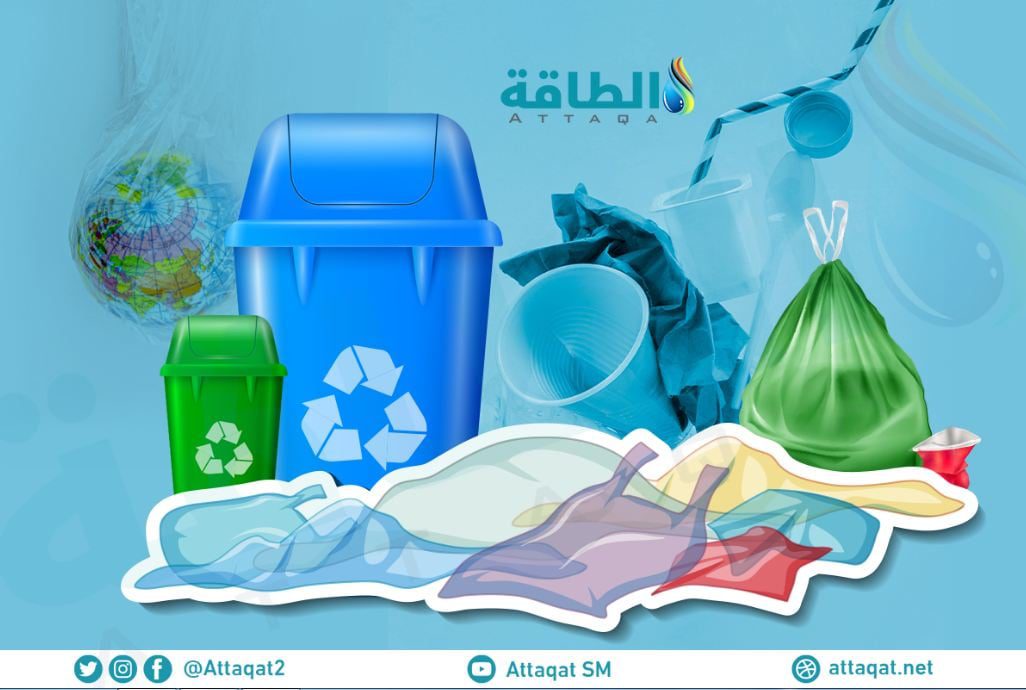The South Korean government has put oil production from plastic at the top of a strategic plan to implement a circular economy that benefits the country, reduces the volume of its imports and contributes to reducing emissions.
Today, Wednesday, June 21 (2023), the government said that South Korea will push for a “circular economy” for key resources, with a focus on recycling in key industries, such as steel, petrochemicals, and batteries, with the aim of reducing carbon emissions.
Under the plan, the government will support efforts to produce oil from plastic through the use of plastic waste and renewal of related policies, according to data seen by the specialized energy platform.
In recent years, many experiments have emerged to return plastic back to its origin (oil), by chemically recycling plastic waste to be a viable alternative to traditional recycling methods in the coming decades.
How to recycle oil from plastic
Industry experts believe that recycling plastic waste with some innovative chemical methods capable of melting all the waste and converting it back into liquid derivatives similar to the oil from which it was indirectly produced, could provide a unique solution to the crisis.
And 90% of plastics in the world are produced from 14 primary chemicals, such as polypropylene and polyethylene, which are materials extracted from oil through petrochemical plants concentrated in mainly oil and gas producing countries.
Research firm Wood Mackenzie confirmed in a previous report that chemical recycling technologies are the closest technical alternative to building a circular economy for plastic waste in order to reduce emissions and reduce demand for crude oil.
The plastics industry consumes approximately 300 million tons of raw chemicals extracted from oil annually, and plastic waste recycling technologies by chemical methods, especially pyrolysis technology, can significantly affect the global demand for raw materials.
The pyrolysis process ends with the reconversion of plastic waste into biofuel, called pyrolysis oil – mainly diesel fuel and fuel oil -, and with advances in pyrolysis technology, along with a greater understanding of the type of waste used, this fuel is used as a feedstock to produce Olefins, a group of major petrochemicals used in the manufacture of plastic and synthetic rubber products.
Circular Economy in South Korea
Under the CE9 project, South Korea will focus on pursuing sustainable growth in nine sectors, namely petrochemicals, steel, non-ferrous metals, batteries, electronics, textiles, automobiles, machinery and cement, according to the Ministry of Trade, Industry and Energy.
The new project focuses on resource efficiency and recycling, as opposed to the traditional “linear economy” approach to collecting, consuming and disposing of raw materials.
“With geopolitical risks such as the ongoing Russian-Ukrainian war and tightening of export controls by major suppliers, global competition to secure resources is intensifying, also due to lack of clarity in supply and prices,” the Ministry of Industry said.
“Since South Korea is an export-oriented economy with a small domestic market, it needs to go beyond its limits in securing used resources,” she added.
For example, South Korea will support the development of technologies to collect lithium and nickel from used electric vehicle batteries.
The Ministry of Industry added that the efforts are necessary given that the global circular economy market is expected to reach $4.5 trillion by 2030.
Waste Recycling
“The circular economy, which focuses on waste recycling, has emerged as a decisive approach to achieving carbon neutrality and a new growth model,” said Finance Minister Cho Kyung Ho, during a meeting with ministers concerned with the economy.
“To this end, the government will make efforts to accelerate the implementation of the circular economy in South Korean industries and harness it as a new growth engine,” Cho said, according to Korea’s Yonhap news agency.
South Korea aims to promote stronger technology cooperation between conglomerates and small businesses, and boost its joint investment in processing facilities to build up the supply chain for recycled resources.
The government announced plans to attract a combined private investment of 5 trillion won (US$3.88 billion) through 2027 in the agricultural sector to boost its competitiveness.
The Ministry of Agriculture said that smart agriculture and food solutions that harness advanced technologies, including information communications and artificial intelligence, indicate high growth potential for the industry.

Corporate support
The government has pledged to encourage investment of about 700 billion won ($540 million) by 2027 to support startups in fields that use the latest scientific technologies, including nuclear fusion.
The number of startups focusing on research and development projects, which totaled 2,879 in 2022, is expected to rise to 5,500 by 2027, the science ministry said, under the set target.
She added that while 75% of these startups lasted for at least 5 years in 2020, the number is expected to rise to 85% in 2027.
“There are still uncertainties surrounding the South Korean economy, including concerns about the global economic slowdown, as well as the volatility of global energy prices,” Cho said.
“While making all efforts to stimulate exports and investment, the government is committed to further enhancing the export competitiveness of our industries and building a business-friendly environment,” he added.

Leave a Reply